|
|
|
Sort Order |
|
|
|
Items / Page
|
|
|
|
|
|
|
| Srl | Item |
| 1 |
ID:
151256
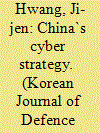

|
|
|
|
|
| Summary/Abstract |
People`s War was originally considered a military concept suited to the traditional battlefields of mainland China, involving the mobilization of the massive populace in order for the inferior forces of the Chinese Communist Party (CCP) to defeat a superior adversary. However, in the past few decades, this tradition of People`s War has not merely been useful for developing military strategy, but has also been applicable to many other national developments, such as economics, social modernization, and government and public affairs, as a vital “behind-the-scenes” guideline to garner a certain consensus from the Chinese people in order to carry out the policies that the Chinese government wishes to implement. In particular, this tradition can be perfectly applied to China`s cyber warfare in the digital age, as the strategic value of cyberspace has removed the restriction of traditional geographic barriers and borders between states. Thus, the potential masses of Chinese “cyber warriors” can carry out attacks geographically unhindered in cyberspace. It is thus of global significance that China, a rising world superpower, is currently expending great effort on developing warfare in cyberspace. This paper investigates how China`s fundamental strategic doctrine, People`s War―which is traditionally based upon geographical battlegrounds―can be integrated into the concept of cyberspace as a potential battlefield. Meanwhile, some interviews were also conducted in Taiwan in order to further dissect some thematic propositions merged from documentary resources.
|
|
|
|
|
|
|
|
|
|
|
|
|
|
|
|
| 2 |
ID:
151255
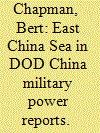

|
|
|
|
|
| Summary/Abstract |
The National Defense Authorization Act of 2000 saw Congress require the Department of Defense (DOD) to prepare an annual report on Chinese military power. This report contains classified and unclassified editions. Documenting Chinese military developments, strategy, and trends are critical parts of these reports. Beijing`s military activities in the East China Sea (ECS) are important report components. This work explains the importance of these and other DOD reports for those studying ECS developments, examines how DOD has documented Beijing`s military activities within these publicly accessible reports, and describes how members of Congress have reacted to ECS developments during the Obama Administration.
|
|
|
|
|
|
|
|
|
|
|
|
|
|
|
|
| 3 |
ID:
151257
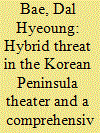

|
|
|
|
|
| Summary/Abstract |
This paper seeks to redefine the concept and status of hybrid warfare through a comprehensive analysis and discussion of various aspects of future warfare. Also the definition of the construct of the hybrid threat and an analysis of the applicability of hybrid warfare in the Korean Peninsula Theater (KPT) is provided in this paper. In addition, on the premise of hybrid threats in the KPT, this paper sets the overall direction of the capability and methods of strategic concept development and concept realization. It suggests a possible direction of improvements for establishing effective and practical, united means for the Republic of Korea (ROK) Armed Forces. In this respect, this paper aims to contribute to creating and proliferating general consensus on balanced, evolutionary development for the inception and employment of appropriate strategy against possible hybrid threats it the KPT. It is also expected that this will assist in establishing or improving the government policy in connection with hybrid threats and in promoting consistency in works related to hybrid threats by setting an appropriate direction for such policies.
|
|
|
|
|
|
|
|
|
|
|
|
|
|
|
|
| 4 |
ID:
151253
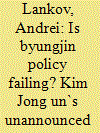

|
|
|
|
|
| Summary/Abstract |
The potential success of North Korea`s policy commonly known as “Byungjin (simultaneous advancement) Line,” is the topic of the present article. Since 2012, the new North Korean leadership has implemented a policy of Byungjin, which implies three major components: cautious market-oriented economic reforms, the development of a full-scale nuclear strike force, and maintenance of very strict surveillance and control systems domestically. It has been argued that the Byungjin policy cannot possibly succeed, but this article demonstrates that, so far, the policy has produced some notable results and delivered a measure of economic growth. This article further argues that the Byungjin policy has the potential of achieving a measure of long-term success, allowing Kim Jong Un and his system to survive for some time, maintaining both political stability and economic growth. It also argues that, given the peculiar international situation of North Korea, and other important variables, including Kim Jong Un`s age, the policy makes perfect sense―if judged from the perspective of the North Korean hereditary ruling elite. This article considers the problems Kim Jong Un`s model of authoritarian developmentalism will face and focuses on both de-stabilizing and stabilizing factors currently at work in North Korea. The article concludes that success of the Byungjin policy is possible, but will lead to a number of new challenges for the outside world.
|
|
|
|
|
|
|
|
|
|
|
|
|
|
|
|
| 5 |
ID:
151252
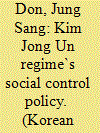

|
|
|
|
|
| Summary/Abstract |
Even during the Kim Jong Un era, the rationing system of North Korea has not yet been recovered. In addition, the thought control system has been weaker than during the Kim Jong Il era. The Kim Jong Un regime stays in power mainly by strengthening political and social control by law enforcement agencies (including police and intelligence agencies). However, there is a lacuna in the control of governmental authority in that giving bribes to public officials enables people to avoid the control. In 2016, social control was strengthened in a situation in which DPRK`s economy cannot be improved due to the sanctions imposed by the UN on it. This will exacerbate the instability of the Kim Jong Un regime. Although the unstable factors during the Kim Jong Un era have increased, it is hard to say that those factors will lead to contingency in North Korea under current conditions. Firstly, a change of people`s consciousness in North Korea is insufficient to bring about a change in its system. Secondly, it is difficult to mobilize and organize the people`s discontent over the Kim Jong-un regime due to the strict control by law enforcement agencies. Thus, a change in the social control system is necessary for fundamental system change in North Korea. To do this, not only further economic sanctions on North Korea and inflow of external information, but also, a lot of pressure especially focused on the North Korean Human Rights Act are required.
|
|
|
|
|
|
|
|
|
|
|
|
|
|
|
|
| 6 |
ID:
151259
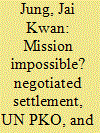

|
|
|
|
|
| Summary/Abstract |
Under what conditions can democracy emerge and survive in countries emerging from violent civil conflicts? Using event history analysis, this article shows that the chance for democratization increases substantially by the combination of two factors: whether a civil war ends through peace negotiations and whether United Nations (UN) peacekeeping forces are deployed after the signing of a peace treaty. Negotiated settlements or UN peacekeeping operations alone cannot resolve the security dilemma and credible commitment problems of civil war adversaries, which are the main obstacles to the transition from war to peace and democracy. Yet these factors have little to do with sustaining democracy in the aftermath of civil war. What matters most for the survival of democracy is rapid economic recovery that can provide better opportunities for former combatants to be reintegrated into normal economic life. These findings suggest that for successful post-conflict democratization the international community should mediate peace negotiations actively and also make a strong effort to maintain peace while helping to reconstruct the war-torn economy.
|
|
|
|
|
|
|
|
|
|
|
|
|
|
|
|
| 7 |
ID:
151258
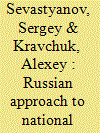

|
|
|
|
|
| Summary/Abstract |
This article is devoted to the research of military and economic aspects of national security of the Russian Federation in the Arctic. The authors consider national riches as the country`s main security object in the region. This work describes basic measures undertaken by Moscow over recent years to improve Russia`s defense capabilities as well as main components of its economic policy in the Arctic. It also analyses positive and negative factors that could influence implementation of Russia`s energy and infrastructure projects in the Arctic. Finally, in the context of the so-called “Russian pivot to the East” the authors assess prospects of Russian cooperation with Asia-Pacific nations (especially China, South Korea and Japan) in the Arctic.
|
|
|
|
|
|
|
|
|
|
|
|
|
|
|
|
| 8 |
ID:
151254
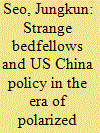

|
|
|
|
|
| Summary/Abstract |
Party polarization is the new buzzword in American politics and yet partisanship seems to play such a small role in determining congressional votes on China policy. We still do not know much about how polarized politics in Washington actually exerts influence in the making of U.S. policy toward Beijing. Paying special attention to America`s response to China from 2001 through 2012, this article seeks to analyze the sources and processes of how party polarization affects foreign policymaking. I argue that with the U.S. president adopting a hands-off approach and parties being polarized, a coalition of ideologically extreme lawmakers is likely to take cross-partisan actions over China. In essence, individual rank-and-file lawmakers tend to step forward and speak out in a party-less manner in the era of polarized America and a rising China.
|
|
|
|
|
|
|
|
|
|
|
|
|
|
|
|
|
|
|
|
|